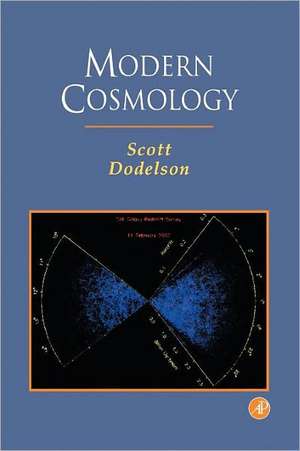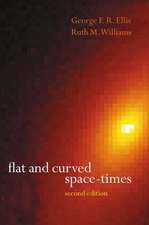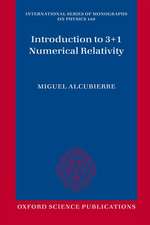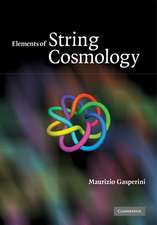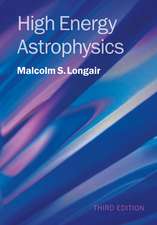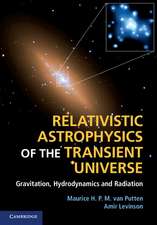Modern Cosmology
Autor Scott Dodelsonen Limba Engleză Hardback – 29 mar 2003
Modern Cosmology is the first book to explain in detail the structure of the acoustic peaks in the CMB, the E/B decomposition in polarization which may allow for detection of primordial gravity waves, and the modern analysis techniques used on increasingly large cosmological data sets. Readers will gain the tools needed to work in cosmology and learn how modern observations are rapidly revolutionizing our picture of the universe.
- Provides foundations, calculations, and interpretations which illuminate current thinking in cosmology
- Covers the major advances in cosmology over the past decade
- Includes over 100 unique, pedagogical figures
Preț: 587.39 lei
Preț vechi: 762.85 lei
-23% Nou
Puncte Express: 881
Preț estimativ în valută:
112.40€ • 117.12$ • 93.06£
112.40€ • 117.12$ • 93.06£
Carte tipărită la comandă
Livrare economică 03-17 aprilie
Preluare comenzi: 021 569.72.76
Specificații
ISBN-13: 9780122191411
ISBN-10: 0122191412
Pagini: 456
Ilustrații: 1
Dimensiuni: 165 x 235 x 26 mm
Greutate: 0.82 kg
Editura: Elsevier
ISBN-10: 0122191412
Pagini: 456
Ilustrații: 1
Dimensiuni: 165 x 235 x 26 mm
Greutate: 0.82 kg
Editura: Elsevier
Public țintă
Researchers in physics, astronomy, and astrophysics, as well as some beginning graduate students.Cuprins
1. The Standard Model and Beyond2. The Smooth, Expanding Universe 3. Beyond Equilibrium 4. The Boltzmann Equations 5. Einstein Equations 6. Initial Conditions 7. Inhomogeneities 8. Anisotropies 9. Probes of Inhomogeneities 10. Weak Lensing and Polarization 11. Analysis
A. Solutions to Selected Problems B. Symbols C. Numbers D. Special Functions
A. Solutions to Selected Problems B. Symbols C. Numbers D. Special Functions
Recenzii
"...I like the choice of topics and detailed derivations of some of the basic processes which cannot be found in any other textbook and which really make this book a textbook out of which one can actually learn something. Examples include detailed derivation of inflationary spectrum, Boltzmann equation etc. ... I also like the extensive list of problems at the end of each chapter. This is a great textbook that is long overdue given the importance of the subject..." --Uros Seljak, Princeton University
"This book is very up to date and gives excellent treatments of structure formation...This provides what is the most complete such description in an textbook." —Paul H. Frampton, Universtiy of North Carolina at Chapel Hill, CERN COURIER (Oct 2003)
"(In) Dodelson's Modern Cosmology we have recently obtained an appropriate textbook for the dawn of this new epoch...In a sense, this book is postmodern cosmology (with an affirmative connotation!), in being the first to consider the new wave of challenges for this oldest scientific philosophical pursuit...it provides an excellent introduction to some of the most dynamical areas in physics and astronomy, very likely to remain attractive for at least a couple of decades." —Milan M. Cirkovic, Astronomical Obervatory of Belgrade, FOUNDATIONS OF PHYSICS (Oct 2003)
"Dodelson writes well and the mathematical derivations are generally well laid out and easy to follow. Useful sets of exercises appear at the end of each chapter, along with suggestions for further reading, often with amusing commentaries. New graduate students, Dodelson's intended audience should find it easy to learn from this book." --George Efstathiou, University of Cambride, England (July 2004)
"This book is very up to date and gives excellent treatments of structure formation...This provides what is the most complete such description in an textbook." —Paul H. Frampton, Universtiy of North Carolina at Chapel Hill, CERN COURIER (Oct 2003)
"(In) Dodelson's Modern Cosmology we have recently obtained an appropriate textbook for the dawn of this new epoch...In a sense, this book is postmodern cosmology (with an affirmative connotation!), in being the first to consider the new wave of challenges for this oldest scientific philosophical pursuit...it provides an excellent introduction to some of the most dynamical areas in physics and astronomy, very likely to remain attractive for at least a couple of decades." —Milan M. Cirkovic, Astronomical Obervatory of Belgrade, FOUNDATIONS OF PHYSICS (Oct 2003)
"Dodelson writes well and the mathematical derivations are generally well laid out and easy to follow. Useful sets of exercises appear at the end of each chapter, along with suggestions for further reading, often with amusing commentaries. New graduate students, Dodelson's intended audience should find it easy to learn from this book." --George Efstathiou, University of Cambride, England (July 2004)
